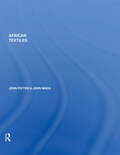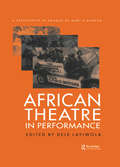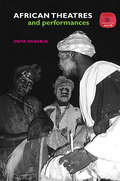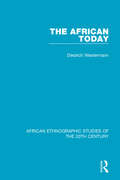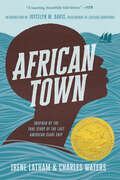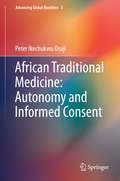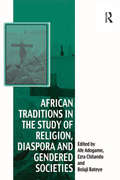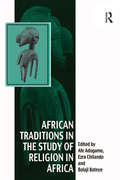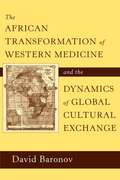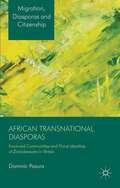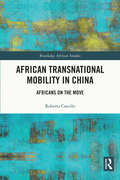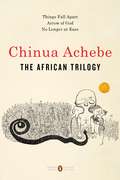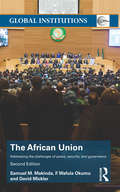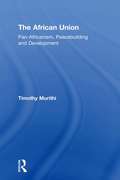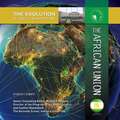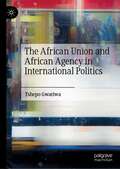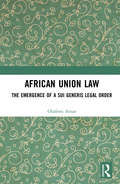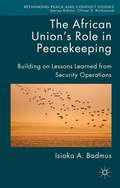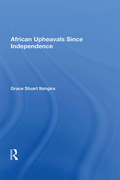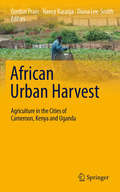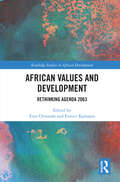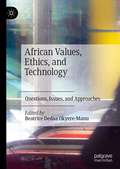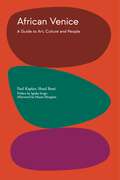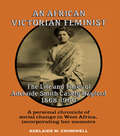- Table View
- List View
African Textiles
by J. PictonAn illustrated survey of African textiles - their design, manufacture, and use - as part of African life, art, and culture.
African Theatre in Performance: A Festschrift in Honour of Martin Banham (Contemporary Theatre Studies #Vol. 35)
by Dele LayiwolaIn this lively and varied tribute to Martin Banham, Layiwola has assembled critical commentaries and two plays which focus primarily on Nigerian theatre - both traditional and contemporary. Dele Layiwola, Dapo Adelugba and Sonny Oti trace the beginnings of the School of Drama in 1960, at the University of Ibadan, Nigeria, where Martin Banham played a key and influential role in the growth of thriving Nigerian theatre repetoire and simulaneously encouraging the creation of a new theatre based on traditional Nigerian theatre forms.This comparative approach is taken up in Dele Layiwola's study of ritual and drama in the context of various traditions worldwide, while Oyin Ogunba presents a lucid picture of the complex use of theatre space in Yoruba ritual dramadar drama.Harsh everyday realitites, both physical and political, are graphically demonstrated by Robert McClaren (Zimbabwe) and Oga Steve Abah (Nigeria) who both show surprising and alarming links between extreme actual experiences and theatre creation and performance. The texts of the two plays - When Criminals Turn Judges by Ola Rotimi, The Hand that Feeds the King by Wale Ogunyemi, are followed by Austin O. Asagba's study of oral tradition and text in plays by Osofisan and Agbeyegbe, and Frances Harding's study on power, language, and imagery in Wole Soyinka's plays.
African Theatres and Performances
by Osita OkagbueAfrican Theatres & Performances looks at four specific performance forms in Africa and uses this to question the tendency to employ western frames of reference to analyze and appreciate theatrical performance. The book examines: masquerade theatre in Eastern Nigeria the trance and possession ritual theatre of the Hausa of Northern Nigeria the musical and oral tradition of the Mandinka of Senegal comedy and satire of the Bamana in Mali. Osita Okagbue describes each performance in detail and discusses how each is made, who it is made by and for, and considers the relationship between maker and viewer and the social functions of performance and theatre in African societies. The discussions are based on first-hand observation and interviews with performers and spectators. African Theatres & Performances gives a fascinating account of these practices, carefully tracing the ways in which performances and theatres are unique and expressive of their cultural context.
The African Today
by Diedrich WestermannOriginally published in 1934, and inevitably a product of the time in which it was published this book nevertheless remains an important volume in African sociology and psychology. Topics such as race, economics, family and kinship, tribal organization, ritual and the supernatural, language and education are discussed in a balanced way, especially given the era of publication.
African Town
by Irene Latham Charles WatersChronicling the story of the last Africans brought illegally to America in 1860, African Town is a powerful and stunning novel-in-verse.In 1860, long after the United States outlawed the importation of enslaved laborers, 110 men, women and children from Benin and Nigeria were captured and brought to Mobile, Alabama aboard a ship called Clotilda. Their journey includes the savage Middle Passage and being hidden in the swamplands along the Alabama River before being secretly parceled out to various plantations, where they made desperate attempts to maintain both their culture and also fit into the place of captivity to which they'd been delivered. At the end of the Civil War, the survivors created a community for themselves they called African Town, which still exists to this day. Told in 14 distinct voices, including that of the ship that brought them to the American shores and the founder of African Town, this powerfully affecting historical novel-in-verse recreates a pivotal moment in US and world history, the impacts of which we still feel today.
African Traditional Medicine: Autonomy And Informed Consent (Advancing Global Bioethics #3)
by Peter Ikechukwu OsujiThis book focuses on informed consent in African Traditional Medicine (ATM). ATM forms a large portion of the healthcare systems in Africa. WHO statistics show that as much as 80% of the population in Africa uses traditional medicine for primary health care. With such a large constituency, it follows that ATM and its practices should receive more attention in bioethics By comparing the ethics of care approach with the ATM approach to Relational Autonomy In Consent (RAIC), the authors argue that the ATM focus on consent based on consensus constitutes a legitimate informed consent. This book is distinctive insofar as it employs the ethics of care as a hermeneutic to interpret ATM. The analysis examines the ethics of care movement in Western bioethics to explore its relational approach to informed consent Additionally, this is the first known study that discusses healthcare ethics committees in ATM.
African Traditions in the Study of Religion, Diaspora and Gendered Societies (Vitality of Indigenous Religions)
by Ezra ChitandoThe historiography of African religions and religions in Africa presents a remarkable shift from the study of 'Africa as Object' to 'Africa as Subject', thus translating the subject from obscurity into the global community of the academic study of religion. This book presents a unique multidisciplinary exploration of African Traditions in the Study of Religion, Diaspora, and Gendered Societies. The book is structured under two main sections. The first provides insights into the interface between Religion and Society. The second features African Diaspora together with Youth and Gender which have not yet featured prominently in studies on religion in Africa. Contributors drawn from diverse African and global contexts situate current scholarly traditions of the study of African religions within the purview of academic encounter and exchanges with non-African scholars and non-African contexts. African scholars enrich the study of religions from their respective academic and methodological orientations. Jacob Kehinde Olupona stands out as a pioneer in the socio-scientific interpretation of African indigenous religion and religions in Africa and the new African Diaspora. This book honours his immense contribution to an emerging field of study and research.
African Traditions in the Study of Religion in Africa: Emerging Trends, Indigenous Spirituality and the Interface with other World Religions (Vitality of Indigenous Religions)
by Ezra ChitandoThe historiography of African religions and religions in Africa presents a remarkable shift from the study of 'Africa as Object' to 'Africa as Subject', thus translating the subject from obscurity into the global community of the academic study of religion. This book presents a unique multidisciplinary exploration of African traditions in the study of religion in Africa and the new African diaspora. The book is structured under three main sections - Emerging trends in the teaching of African Religions; Indigenous Thought and Spirituality; and Christianity, Hinduism and Islam. Contributors drawn from diverse African and global contexts situate current scholarly traditions of the study of African religions within the purview of academic encounter and exchanges with non-African scholars and non-African contexts. African scholars enrich the study of religions from their respective academic and methodological orientations. Jacob Kehinde Olupona stands out as a pioneer in the socio-scientific interpretation of African indigenous religion and religions in Africa. This book is to his honour and marks his immense contribution to an emerging field of study and research.
The African Transformation of Western Medicine and the Dynamics of Global Cultural Exchange
by David BaronovBeginning with the colonial era, Western biomedicine has radically transformed African medical beliefs and practices. Conversely, in using Western biomedicine, Africans have also transformed it. The African Transformation of Western Medicine and the Dynamics of Global Cultural Exchange contends that contemporary African medical systems—no less “biomedical” than Western medicine—in fact greatly enrich and expand the notion of biomedicine, reframing it as a global cultural form deployed across global networks of cultural exchange. The book analyzes biomedicine as a complex and dynamic sociocultural form, the conceptual premises of which make it necessarily subject to ongoing change and development as it travels the globe. David Baronov captures the complexities of this cultural exchange by using world-systems analysis in a way that places global cultural processes on equal footing with political and economic processes. In doing so, he both allows the story of Africa’s transformation of “Western” biomedicine to be told and offers new insights into the capitalist world system.
African Transnational Diasporas
by Dominic PasuraThis book examines the relationships, connections, identities and linkages between diasporas and their original or symbolic homelands. To highlight the transnationality of diasporas, the book proposes a framework for understanding African diasporas as core, epistemic, dormant and silent diasporas. As the book argues, transnational diasporas, just as other social formations, are multifaceted fluid entities which continually mutate over time and space. By way of empirical illustration, the book investigates the formation of the Zimbabwean diaspora by examining how the diaspora was dispersed, how it is constituted in Britain and how it maintains connections with the homeland. Using evidence from multi-sited ethnographic data, the book examines the articulation of plural diasporic identities by migrants in different social, cultural, religious and political settings. Whereas the concept of diaspora typically emphasizes group cohesion and solidarity, the book argues that the Zimbabwean diaspora has to be understood as fractured and fragmented.
African Transnational Mobility in China: Africans on the Move (Routledge African Studies)
by Roberto CastilloConsidering the African presence in China from an ethnographic and cultural studies perspective, this book offers a new way to theorise contemporary and future forms of transnational mobilities while expanding our understandings around the transformations happening in both China and Africa. The author develops an original argument and new theoretical insights about the significance of the African presence in Guangzhou, and presents an invaluable case study for understanding particular modes of transnational mobility. More broadly, it challenges forms of (re)presenting and producing knowledge about subjects on the move; and it transforms existing theorisations and critical understandings of mobility and its shaping power. Through an ethnographic approach, the book brings us closer to a number of practices, features and objects that, while characterising the lives of Africans in Guangzhou, are also evidence of the interplay between individual aspirations, and the structural constraints embedded in contemporary regimes of transnational mobility. Raising critical questions about ways of (un)belonging in the precarious settings of neoliberal modernity and the future of African mobilities, this book will be of interest to scholars of transnational, African and Chinese Studies.
African Traveler: The Story of Mary Kingsley
by Ronald SymeAfrican Traveler: The Story of Mary Kingsley by Ronald Syme
The African Trilogy: Things Fall Apart; Arrow of God; No Longer at Ease
by Chinua Achebe Kwame Anthony AppiahChinua Achebe is considered the father of modern African literature, the writer who "opened the magic casements of African fiction." The African Trilogy--comprised of Things Fall Apart, Arrow of God, and No Longer at Ease--is his magnum opus. In these masterly novels, Achebe brilliantly imagines the lives of three generations of an African community as their world is upended by the forces of colonialism from the first arrival of the British to the waning days of empire.The trilogy opens with the groundbreaking Things Fall Apart, the tale of Okonkwo, a hero in his village, whose clashes with missionaries--coupled with his own tragic pride--lead to his fall from grace. Arrow of God takes up the ongoing conflict between continuity and change as Ezeulu, the headstrong chief priest, finds his authority is under threat from rivals and colonial functionaries. But he believes himself to be untouchable and is determined to lead his people, even if it is towards their own destruction. Finally, in No Longer at Ease, Okonkwo's grandson, educated in England, returns to a civil-service job in Lagos, only to see his morality erode as he clings to his membership in the ruling elite. Drawing on the traditional Igbo tales of Achebe's youth, The African Trilogy is a literary landmark, a mythic and universal tale of modern Africa. As Toni Morrison wrote, "African literature is incomplete and unthinkable without the works of Chinua Achebe. For passion, intellect and crystalline prose, he is unsurpassed."
The African Union: Addressing the challenges of peace, security, and governance (Global Institutions)
by Samuel M. Makinda F. Wafula Okumu David MicklerFully revised and updated, the second edition of The African Union continues to offer the most comprehensive overview of the work of the African Union (AU), with special emphasis on its capacity to meet the challenges of building and sustaining governance institutions and security mechanisms. This new edition: Re-examines the African Union at the historic moment of the golden jubilee of the OAU, its predecessor. It examines the AU’s efforts in its first decade, points out some of the organization’s weaknesses, and posits options for addressing more effectively the challenges of peace, security, and governance in coming years. Critically reviews several arrangements and initiatives, including the African Peace and Security Architecture (APSA) and the African Peer Review Mechanism (APRM). Analyses performance of key institutions and programs of the AU, including the Commission, the Executive Council, the Assembly, and the Pan-African Parliament (PAP) as well as the New Partnership for Africa’s Development (NEPAD). Discusses how far instability and insecurity on the continent are consequences of bad governance and the lack of strategic leadership. Considers how the absence of a clearly articulated ideology may undermine the implementation of the AU Agenda. In addition to offering revised and updated chapters throughout, this edition includes one new chapter, which critically discusses the AU’s new international partnerships. With an emphasis on the current work of the AU and a view to the future of the organization, this book is essential reading for students and scholars researching African Politics and international organizations.
The African Union: Pan-Africanism, Peacebuilding and Development
by Timothy MurithiThe African Union was established in July 2002 by African leaders, evolving from the Organization of African Unity (OAU). However the idea of the African Union can be traced to the Pan-Africanist movement. Timothy Murithi looks at the emergence of Pan-Africanism and how it was institutionalized through the Pan-African Congress and the OAU. He argues that the African Union represents the third phase of the institutionalization of Pan-Africanism. The book examines the limitations of the OAU and discusses whether the African Union can adopt a more interventionist stance in dealing with peacebuilding and development in Africa. The volume assesses the African Union's peace and security institutions and analyzes how it is beginning to collaborate with civil society. It takes a critical look at the Union's New Partnership for Africa's Development (NEPAD) and argues that Africa needs to adopt a developmental and governance agenda that will be much more responsive towards improving the well-being and livelihood of its peoples.
The African Union (The Evolution of Africa's Major Nations)
by Russell RobertsBeset by war, disease, famine, human rights abuses, and numerous other problems, Africa today is a continent in need of good leadership. Many people believe the only way Africa will be able to solve its many challenges is by uniting the more than 50 nations on the continent. To that end, the African Union was formed in 2002 as a successor to the largely ineffective Organization of African Unity. The purpose of the African Union is to turn Africa into a political and economic power. The new organization faces many challenges, and the solutions to Africa's problems will not be easy to find. Yet on its shoulders the African Union carries the hopes and dreams of a continent.
The African Union and African Agency in International Politics
by Tshepo GwatiwaThis book examines the role of the African Union in relation to African agency in international politics. It examines the manner and extent to which the African Union exercises two forms of agency—shirking and slippage—in its strategic and collaborative partnerships. The author focuses on four major AU partnerships with the European Union, NATO, the United Nations and US AFRICOM. The books examines African agency in each partnership by exploring the politics and dynamics of each partnership in different aspects: the multilevel engagement, institutionalization, resource contribution and disbursement, as well as preference linkage. It specifically does that by examining African ownership and leadership in all of these aspects. The book highlights the role of agency slack as a survival strategy to escape from the AU’s subaltern position in international politics. It designates the partnership with the European Union as emblematic of African agency; while the others exhibit different forms of agency slack. Partnerships with NATO and the United Nations exhibit shirking, while that with the US AFRICOM exhibits slippage.
African Union Law: The Emergence of a Sui Generis Legal Order
by Olufemi AmaoThis book explores the emergence of African Union (AU) law as a legal order and its implications for existing order in the region. As an authoritative text on the development of AU law, the book covers such pertinent issues as legislative powers, competences, direct effect in AU law, subsidiarity, interventionism, and enforcement of laws. Olufemi Amao argues that there is a gradual movement from intergovernmentalism to supranationalism in the African Union legal order, and explores how this trajectory gradually and incrementally de-emphasises the discourse on nation state sovereignty; a concept that has caused many problems in the African context. Drawing upon EU law as a comparison, the book also examines how the development of supranationalism affects crucial issues such as human rights, democratic reforms, territorial matters, tribal and religious disputes, and economic relations. As a comprehensive examination of the development of law within a union, this book will be of great interest and use to students, scholars and practitioners in international law, international relations, and African studies.
The African Union’s Role in Peacekeeping
by Isiaka A. BadmusThis study examines the African Union's peacekeeping role in managing African conflicts. Based on a qualitative research methodology, it analyses AU peace operations in Burundi and Somalia, and hybrid peacekeeping in Darfur, in order to identify the lessons learned and suggest how future outcomes may be improved.
African Upheavals Since Independence
by Grace Stuart IbingiraGrace Ibingira seeks the fundamental causes of the widespread upheavals (at least thirty-eight army coups in the past fifteen years) in African states today and finds them in the inadequate colonial preparation of African leaders for the responsibilities of independence, the earlier practices of "divide and raie, and the "winner-take-all policies o
African Urban Harvest: Agriculture in the Cities of Cameroon, Kenya and Uganda
by Gordon Prain Nancy Karanja Diana Lee-SmithOver the past two decades, how has urban agriculture changed in sub-Saharan Africa? Is city farming now better integrated into environmental management and city governance? And, looking ahead, how might urban agriculture address the needs of the low-income households and modernizing cities of Africa? In this book, leading specialists in the fields of urban agriculture and urban environment present a unique collection of case studies that examines the growing role of local food production in urban livelihoods in sub-Saharan Africa. Amongst many issues, the authors probe the changing role of urban agriculture, the risks and benefits of crop-livestock systems, and the opportunities for making locally produced food more easily available and more profitable. Concluding chapters reflect on the policy and governance implications of greater integration of urban natural resources and the built environment, an expanded role for urban agriculture in sub-Saharan Africa and the crucial role of women in urban food systems. African Urban Harvest will be of interest to decision-makers, development professionals, researchers, academics, and students and educators in urban planning, development studies, African studies, and environmental studies.
African Values and Development: Rethinking Agenda 2063 (Routledge Studies in African Development)
by Ezra Chitando Eunice KamaaraThis book considers the importance of African values, not only in catalysing development, but in sustaining it. Arguing for an urgent need for rapprochement between African politicians and intellectuals, the book discusses how African values and identities can contribute to the successful realization of initiatives such as the African Union’s Agenda 2063 and the United Nation’s Sustainable Development Goals (SDGs). Over the course of the book, the authors consider key themes such as identity, indigenous and modern worldviews; personhood; individual and communal perspectives; peace and conflict; and well-being. The book explores the role of religion and moral values, as well as African worldviews such as Ubuntu. Overall, the book demonstrates that African values will be central to galvanising Africa’s post-colonial transformation. This book will be an important read for policymakers and for researchers working on African development, politics, sociology, religion and philosophy.
African Values, Ethics, and Technology: Questions, Issues, and Approaches
by Beatrice Dedaa Okyere-ManuThis book charts technological developments from an African ethical perspective. It explores the idea that while certain technologies have benefited Africans, the fact that these technologies were designed and produced in and for a different setting leads to conflicts with African ethical values. Written in a simple and engaging style, the authors apply an African ethical lens to themes such as: The Fourth Industrial Revolution, the moral status of technology, technology and sexual relations, and bioethics and technology.
African Venice: A Guide to Art, Culture and People
by Shaul Bassi Paul KaplanAfrican Venice is the first guidebook to the extensive historical and contemporary African presence in the city of the lagoons. A set of ten walking tours highlights images of Black people in Venetian art from the Middle Ages to the present, the afterlife of Shakespeare’s Othello, the painful local legacies of slavery and Italian colonialism, and the remarkable visibility of African and Afro-descendant artists at the Venice Biennale. These tours are enriched by more than twenty essays, poems, and reflections that celebrate, question, and reimagine Venice’s Black past and present. From premodern paintings and sculpture to contemporary artworks, African Venice will show you the city as you have never seen it.The book includes contributions from Marilena Umuhoza Delli, Rita Dove, Emiliano Guaraldo, Eddy L. Harris, Lorenzo Lazzarini, Ibrahima Lö, Vittorio Longhi, Olga Manente, Tony Mochama, Yvonne Adhiambo Owuor, Caryl Phillips, Sandra Stocchetto, Sami Tchak, Ngūgī wa Thiong’o, and Alessandra Viola.
An African Victorian Feminist: The Life and Times of Adelaide Smith Casely Hayford 1848-1960
by Adelaide M CromwellFirst published in 2004. Routledge is an imprint of Taylor & Francis, an informa company.
